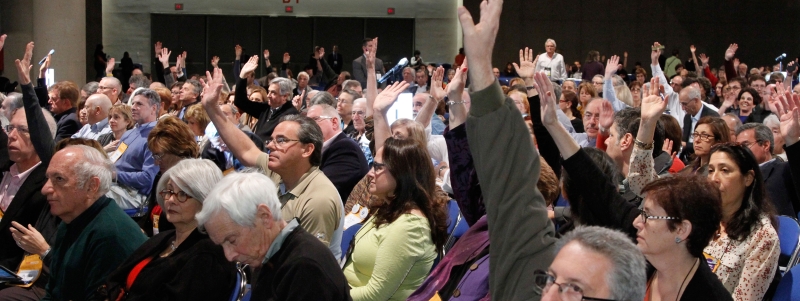Submitted by the Commission on Social Action of Reform Judaism
Background
Throughout the history of the Jewish people, one of the most sacred commandments has been pikuach nefesh, the idea that the preservation of life takes precedence over almost all other Jewish laws. The Talmud teaches that "One who saves one life, it is accounted as if a world is saved,"1 and the medieval Jewish philosopher-physician Maimonides wrote: "God created food and water; we must use them in staving off hunger and thirst. God created drugs and compounds and gave us the intelligence necessary to discover their medicinal properties; we must use them in warding off illness and disease."2
One of the most important achievements in human history when it comes to enhancing public health has been the development of vaccines. According to the U.S. Department of Health and Human Services, a vaccine is "a product that produces immunity from a disease and can be administered through needle injections, by mouth, or by aerosol."3 Vaccines "trick" the immune system into thinking an infection has occurred. The immune system then attacks the harmless vaccine and prepares for future invasions, thus immunizing the individual.
In addition to inoculating the individual, vaccines contribute to the creation of "community (or herd) immunity." According to the U.S. Department of Health and Human Services, "When a critical portion of a community is immunized against a contagious disease, most members of the community are protected against that disease because there is little opportunity for an outbreak. Even those who are not eligible for certain vaccines—such as infants, pregnant women or immuno-compromised individuals—get some protection because the spread of contagious disease is contained. This is known as ‘community immunity.'"4
Recently, a notable increase in the number of measles and whooping cough diagnoses have drawn attention to declining immunization rates across North America and a potential weakening in community immunity. This is of particular concern to U.S. public health officials who had declared measles eliminated nationwide in the year 2000.
A 1999 CCAR responsum on Compulsory Immunization (5759.10), finds that vaccines qualify as refu'ah bedukah, proven remedies, and are therefore an obligation. The responsum states that "Jewish tradition would define immunization as part of the mitzvah of healing and recognize it as a required measure, since we are not entitled to endanger ourselves or the children for whom we are responsible by refusing proven medical treatment." Moreover, the responsum endorses "programs of compulsory immunization in our communities, with exemptions granted to those individuals whose medical conditions place them at particular risk of injury or untoward side effects. Aside from those individual cases, there are no valid Jewish religious grounds to support the refusal to immunize as a general principle."
Currently, all fifty U.S. states have compulsory vaccination laws. Reflecting the diversity of faith traditions in North American life, and the fact that some faith traditions reject the practice of vaccination, forty-seven states offer religious and/or personal/philosophical vaccination exemptions. In Canada, only two provinces require students to be vaccinated before entering school, and medical, philosophical, and religious exemptions exist. At the same time, private institutions in both countries retain the discretion to set their own, stricter vaccination policies.
The consensus view of Reform Judaism, including that established in the aforementioned CCAR responsum, embraces the vital role vaccines play in ensuring individual and public health. For that reason, the longstanding and ongoing policy for all individuals attending URJ camps and Israel programs has been to require immunization for all children, staff, faculty, and their families with exemptions permitted only in strictly limited and specifically enumerated medical circumstances.5
THEREFORE, BE IT RESOLVED that the Union for Reform Judaism:
- Affirms that in the case of mandatory immunizations, pikuach nefesh and refu'ah bedukah are our guiding principles. Reform Jewish religious tenets prioritize protecting the health of all individuals, the most medically vulnerable members of the community, and the community as a whole, and do not provide a basis for a religious exemption from mandatory immunizations.
- Supports mandatory immunization laws, with the only acceptable exemptions being:
- Medical exemptions; and
- Religious exemptions, which must be suspended if community immunity is deemed at risk by public health officials.
- Urges Reform Movement congregations and institutions to
- Adopt policies that require mandatory vaccinations with medical exemptions in programs that serve children and youth; and
- Educate members and the broader community about the scientific evidence and Jewish values in support of mandatory vaccinations.
[1] Mishnah Sanhedrin 4:9
[2] Maimonides's Commentary on Mishnah Pesachim 4:9
[5] 2014 Policy Statement on Vaccine Status of Campers, Staff, Faculty, and their Families Attending URJ Camps and Israel Programs
Give to the URJ
The Union for Reform Judaism leads the largest and most diverse Jewish movement in North America.
